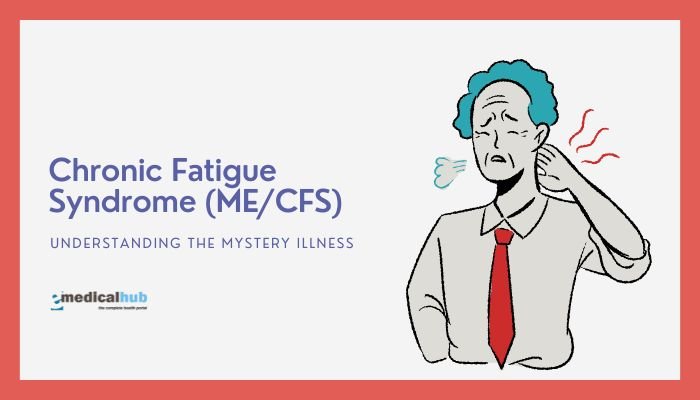Introduction
Chronic Fatigue Syndrome (CFS), commonly referred to by the broader term Myalgic Encephalomyelitis/Chronic Fatigue Syndrome (ME/CFS), remains one of the most perplexing conditions in modern medicine.
Despite decades of research, it continues to challenge clinicians, researchers, and patients alike with its elusive cause, spectrum of symptoms, and limited treatment options. Sometimes mislabeled as a “mystery illness,” ME/CFS is characterized by disabling fatigue that is not relieved by rest and significantly impacts quality of life, along with a range of other physical, cognitive, and neurological manifestations.
This article delves into the history, diagnostic criteria, potential biological underpinnings, and current management strategies for ME/CFS. We will address the controversies and complexities surrounding the disease, the daily struggles of those afflicted, and how ongoing research is shedding new light on a condition once dismissed as “all in the head.”
Understanding ME/CFS goes beyond unraveling a medical enigma; it underscores the importance of empathy, patient-centered care, and the promise of scientific breakthroughs for millions worldwide who bear its burden.
Defining ME/CFS
Terminology and Classification
- Myalgic Encephalomyelitis (ME): The term used more commonly in the UK and some other countries, emphasizing the inflammatory and neurological components (“encephalomyelitis” suggests brain and spinal cord inflammation).
- Chronic Fatigue Syndrome (CFS): Used frequently in North America and some international health guidelines. Although it underscores fatigue, it may overlook or minimize the full complexity of symptoms.
- ME/CFS: Increasingly adopted to encompass both designations, reflecting its multifactorial nature. Some organizations, like the Institute of Medicine (IOM), introduced the term “Systemic Exertion Intolerance Disease (SEID),” though it hasn’t achieved broad clinical usage.
Diagnostic Criteria
There is no single globally uniform criterion, but common frameworks include:
- Fatigue: Persistent or relapsing, often lasting at least six months, which is profound and interferes with daily functioning.
- Post-Exertional Malae (PEM): Worsening of symptoms following physical or mental activity, which can last days or weeks.
- Unrefreshing Sleep: Despite extended rest, patients wake feeling unrested.
- Cognitive Impairment (“Brain Fog”): Difficulty concentrating, memory lapses, or slowed thinking.
- Orthostatic Intolerance: Some patients experience dizziness or palpitations on standing (e.g., POTS).
The IOM’s 2015 report suggests that for an ME/CFS diagnosis, PEM is crucial, along with at least one manifestation of cognitive impairment or orthostatic intolerance. Symptom severity and chronicity play key roles; these issues usually persist for months, if not years.
Prevalence and Demographics
- Global Distribution: Found worldwide across diverse ethnicities and socioeconomic backgrounds.
- Prevalence: Estimates vary (0.2–2% globally), partly due to differing definitions and underdiagnosis.
- Gender and Age: More common in females, with onset typically between 20–40 years old, though it can develop at any age (including children).
Key Point: ME/CFS is a heterogeneous disorder, often making diagnosis lengthy. Patients may see numerous specialists before obtaining a confirmed diagnosis.
Historical Context and Controversies
Early Recognition
- 1950s–1980s: Reports of outbreaks labeled under various names (e.g., “Royal Free disease,” “Iceland disease”) described flu-like symptoms, prolonged fatigue, and neurological complaints.
- “Yuppie Flu”: In the 1980s, media sometimes belittled the condition as “yuppie flu,” fueling stigma by associating it with affluent, stressed professionals.
Shifting Perceptions
- Psychological vs. Organic Debate: Historically, many clinicians attributed CFS to psychosomatic or behavioral issues. Research, however, reveals physiological abnormalities (immune, neurological, endocrine).
- Biomedical Advances: Over time, data about immune dysregulation, viral triggers (e.g., Epstein-Barr virus), and metabolic anomalies have contributed to a growing consensus that ME/CFS is a legitimate biomedical condition.
Ongoing Discussion
- Diagnostic Challenges: Without a single biomarker, controversies persist in some corners of medicine about classification and treatment approaches.
- Patients’ Advocacy: Patient groups have strongly advocated for recognition and research funding, helping reframe it as a disabling physical disease rather than a psychological one.
Signs and Symptoms in Detail
Persistent Fatigue
- Nature: Profound tiredness disproportionate to exertion, not improved by rest. Some describe a sense of being “completely drained” or “physically heavy.”
- Daily Impact: Even mild tasks (house chores, desk work) may require substantial recuperation time.
Post-Exertional Malaise (PEM)
- Defining Feature: A hallmark. After physical or mental activity, patients experience exacerbated fatigue, pain, or cognitive dysfunction.
- Delayed Onset: Often 24–48 hours after exertion. This unpredictably forces pacing and can hamper normal life.
Neurological and Cognitive Problems
- Concentration and Memory: Difficulty in focusing, word-finding issues, or forgetting recent events.
- Sensory Sensitivities: Some report hypersensitivity to light, sound, or certain chemicals.
Sleep Disturbances
- Non-Restorative Sleep: Waking up exhausted, insomnia, or disruptive sleep cycles.
- Circadian Rhythm: Some develop flipped sleeping (awake at night, asleep by day).
Pain and Other Physical Complaints
- Muscle Aches: Achy or burning sensations, sometimes confused with fibromyalgi
- Joint Pain: Typically migratory, with no evident redness or swelling.
- Headaches: Tension-type or migraines, often chronic
Autonomic Symptoms
- Orthostatic Intolerance: POTS or neurally mediated hypotension can cause faintness, rapid heartbeat upon standing.
- Temperature Dysregulation: Some patients can’t maintain stable body temperature, feeling chills or sweats unpredictably.
Note: Each patient’s symptom cluster varies widely, with fluctuations over time (relapses and remissions) that hamper daily functioning.
Potential Causes and Pathophysiology
Viral Triggers
- Common Infectious Initiators: EBV, human herpesvirus-6, cytomegalovirus, enteroviruses have been implicated.
- Causative vs. Causal: Some patients recall a severe viral-like illness before onset. But direct cause-effect remains unproven.
Immune System Dysfunction
- Chronic Inflammation: Elevated cytokines (e.g., IL-6, TNF-α) in some cohorts point to immune activation.
- Autoimmune Angle: Hypotheses suggest the body might attack its own cells after certain triggers, akin to lupus or rheumatoid arthritis.
- Low Natural Killer (NK) Cell Function: Studies show reduced NK cell activity, impairing clearance of pathogens.
Dysautonomia and Neurological Abnormalities
- Brain Imaging: Some evidence of altered white matter or reduced blood flow in certain brain regions.
- Autonomic Dysregulation: Contributing to POTS, poor thermoregulation, and gastrointestinal motility issues.
Mitochondrial and Metabolic Theories
- Energy Production: Potential mitochondrial dysfunction leading to inadequate ATP generation, explaining the severe fatigue post-exertion.
- Metabolomics: Emerging data reveals abnormal metabolic pathways (e.g., amino acid profiles, lipid metabolism) consistent with chronic energy depletion.
Genetic Susceptibility
- Twin Studies: Suggest a genetic predisposition. But no single gene explains the complexity; likely polygenic influences.
- Epigenetics: Environmental triggers may alter gene expression, compounding vulnerability.
Diagnosing ME/CFS
Rule Out Other Conditions
- Differential Diagnosis: Hypothyroidism, celiac disease, major depression, multiple sclerosis, or fibromyalgia can present overlapping symptoms. Thorough lab work and imaging can exclude such conditions.
- Comorbidities: Many with ME/CFS also have IBS, migraine, or fibromyalgia, complicating clarity.
Case Histories and Assessment Tools
- Symptom Duration: At least 6 months of persistent fatigue is typically required for adult diagnoses (3 months for children).
- Functional Impact: Doctors consider how severely daily activities are curtailed.
- Specialized Questionnaires: Tools like the DePaul Symptom Questionnaire or the SF-36 for functional scoring
Emerging Diagnostic Biomarkers
- Research Realm: Searching for biomarkers—like certain cytokine profiles, cardiopulmonary exercise test anomalies, or epigenetic signatures.
- 2-Day CPET: Some clinicians use repeated cardiopulmonary exercise testing that reveals dramatic post-exertional drops in performance specific to ME/CFS.
Treatment and Management Approaches
No Single Cure, Focus on Symptom Alleviation
- Personalized Plans: Because presentations vary, each patient’s regimen may differ—some emphasize pain control, others focus on sleep interventions.
- Collaborative Care: Primary care doctors, specialists (neurologists, rheumatologists), and allied health professionals like occupational therapists or dietitians.
Pacing and Activity Management
- Energy Envelope: A crucial concept where patients learn to stay within their threshold of mental/physical exertion to avoid crashes.
- Adaptive Techniques: Breaking tasks into smaller steps, frequent rest intervals, usage of assistive devices (mobility aids).
- Controversy Over Exercise: Traditional Graded Exercise Therapy (GET) is now approached cautiously. Many patients find overexertion triggers severe PEM, thus gentle stretching or incremental exercise is recommended only if carefully monitored.
Medications
- Symptomatic Relief: Low-dose antidepressants for pain or sleep (e.g., low-dose tricyclics), analgesics for muscle/joint pain, or short-term sleep aids.
- Orthostatic Intolerance: Beta-blockers, fludrocortisone, or midodrine might help if POTS is significant.
- Immunomodulatory Trials: Some off-label or experimental therapies (e.g., IVIG, rituximab) have yielded mixed results in small studies.
Behavioral and Psychosocial Support
- CBT (Cognitive Behavioral Therapy): Aims to address illness coping strategies, though it should not be misconstrued as a cure. Some patients find it beneficial to help manage the emotional burden.
- Support Groups: Peer-led communities, both online and offline, can reduce isolation, share coping tips.
Nutritional Support
- Balanced Diet: Minimizing processed foods, focusing on nutrient density, ensuring adequate protein, vitamins, and minerals.
- Avoiding Triggers: Some find removing inflammatory foods (excess sugar, possible allergies) beneficial; evidence is anecdotal but worth exploring individually.
Living with ME/CFS
Daily Challenges
- Cyclical Symptoms: Good days and bad days—lack of predictability can disrupt work, social life, and mental health.
- Employment: Many patients reduce hours, shift to flexible or remote arrangements. Some qualify for disability if severely impacted.
- Family and Relationships: Partners or caregivers often share the burden, adapting household responsibilities to unpredictable symptom flares.
Coping Strategies
- Set Realistic Goals: Accept that certain activities might be postponed or scaled back.
- Mindfulness and Stress Reduction: Meditation, gentle yoga, or breathing exercises can help reduce tension.
- Multi-Disciplinary Rehab: Combined physical therapy, psychological support, and lifestyle adjustments can optimize function within the condition’s constraints.
Advocacy and Community Resources
- Patient Organizations: E.g., Solve ME/CFS Initiative, ME Association in the UK, Emerge Australia, etc., offering education, advocacy, and support.
- Online Forums: Places like Phoenix Rising or social media groups unify patients, share experiences, and track emerging treatments.
- Awareness Campaigns: The “Millions Missing” movement highlights the plight of those severely limited by ME/CFS, urging better funding and recognition.
Research Frontiers and Emerging Hope
Breaking the Knowledge Barriers
- Government Funding: NIH and other agencies have boosted research budgets in recent years. Large-scale studies aim to clarify pathophysiology.
- Biomarkers: Investigations into markers of immune activation, metabolic or epigenetic signatures that could yield diagnostic tests or targeted therapies.
- Clinical Trials: Trials are exploring antivirals, immunomodulators, or advanced dietary supplements to see if they shift disease progression.
Personalized Medicine Prospects
- Subgrouping: Recognizing that ME/CFS might be multiple sub-conditions with distinct triggers or immune profiles. Personalized approaches may be more effective than one-size-fits-all.
- Artificial Intelligence: Potentially sifting large data sets to find patterns or “clusters” in patient presentations to refine treatments.
Ongoing Debates and Collaboration
- Definitions: Continued push for unifying definitions that are widely accepted. The shape of diagnostic criteria heavily influences research outcomes.
- Multi-Disciplinary Teams: Cross-collaboration among immunologists, neurologists, endocrinologists, and psychosocial experts fosters a holistic perspective—vital for unraveling a condition spanning multiple body systems.
Practical Takeaways for Patients and Caregivers
- Pace, Pace, Pace: Understanding and respecting energy limits is crucial to avoid crashes.
- Seek Specialist Care: A provider familiar with ME/CFS ensures better symptom management; not all doctors have in-depth knowledge.
- Document Symptoms: Keeping a diary helps track potential triggers, medication responses, or patterns over time.
- Explore Support: Lean on reputable patient groups or advocacy organizations for updated info and moral support.
- Remain Informed: With ongoing research, new findings or potential treatments may emerge.
- Manage Comorbidities: Conditions like dysautonomia or fibromyalgia often co-occur, requiring integrated care.
Conclusion
Myalgic Encephalomyelitis/Chronic Fatigue Syndrome stands at the crossroads of modern medicine, embodying both the complexity of a multi-systemic illness and the urgency for better diagnostics and therapies. Once marginalized as a psychological anomaly, ME/CFS is increasingly recognized as a legitimate, life-altering condition with biological underpinnings rooted in immunological, neurological, and metabolic dysfunction.
Its hallmark symptoms—profound fatigue, post-exertional malaise, cognitive challenges—disrupt countless lives, but also spurred a determined community of patients, clinicians, and researchers striving to uncover solutions.
While no cure or singular biomarker exists yet, strides made in the scientific community and expansions in public awareness signal hope for the future. In the interim, management demands a flexible, patient-centered approach, blending pacing strategies, evidence-based symptomatic treatments, and psychosocial support.
Collaboration among global medical experts, philanthropic investments, and strong patient advocacy remains essential to decode the mystery of ME/CFS, ensuring that individuals can lead fulfilling lives in spite of persistent challenges.
Frequently Asked Questions (FAQ)
- Is ME/CFS just chronic tiredness or a psychological issue?
- ME/CFS involves profound physical and neurocognitive symptoms that go well beyond normal tiredness. Scientific consensus recognizes it as a biological, not purely psychological, disorder.
- Are there specific blood tests to confirm ME/CFS?
- Currently, no single diagnostic biomarker or test. Diagnosis is by clinical criteria after excluding other causes. Research is ongoing to find more definitive biomarkers.
- Can exercise cure ME/CFS?
- Gentle activity can help some stable patients, but excessive exercise often triggers post-exertional malaise. Graded Exercise Therapy was once recommended, but now many guidelines emphasize cautious pacing.
- What triggers an ME/CFS relapse or crash?
- Physical or mental overexertion, stress, inadequate rest, and sometimes infections. Each patient’s triggers can differ.
- Do dietary changes help?
- Some patients report improvement with balanced diets, stable blood sugar levels, or excluding inflammatory foods. Results vary, so approach is individualized.
- Is it contagious or genetic?
- Not considered directly contagious. While not purely inherited, certain genetic predispositions plus environmental triggers (e.g., a viral infection) can factor into ME/CFS development.
Where can I find reliable resources or support? - Official bodies like the CDC or NIH websites, recognized charities (Solve ME/CFS Initiative, ME Association), and local patient organizations offer updated medical guidance and community forums.
- Not considered directly contagious. While not purely inherited, certain genetic predispositions plus environmental triggers (e.g., a viral infection) can factor into ME/CFS development.
References
- Institute of Medicine (US). Beyond Myalgic Encephalomyelitis/Chronic Fatigue Syndrome: Redefining an Illness. Washington, DC: National Academies Press; 2015.
- Carruthers BM, van de Sande MI, De Meirleir KL, et al. Myalgic encephalomyelitis: International Consensus Criteria. J Intern Med. 2011;270(4):327-338.
- Fukuda K, Straus SE, Hickie I, et al. The Chronic Fatigue Syndrome: A comprehensive approach to its definition and study. Ann Intern Med. 1994;121(12):953-959.
- Jason LA, Evans M, Porter N, Brown M. What is the current functional status of individuals with ME/CFS? J Clin Psychol Med Settings. 2010;17(4):256-261.
- Komaroff AL. Advances in understanding the pathophysiology of chronic fatigue syndrome. JAMA. 2019;322(6):499-500.
- Naviaux RK, et al. Metabolic features of chronic fatigue syndrome. Proc Natl Acad Sci U S A. 2016;113(37):E5472-E5480.
- Katz BZ, Jason LA. Chronic fatigue syndrome following infections in adolescents. Curr Opin Pediatr. 2013;25(1):95-102.
- Brown AA, Jason LA. Meta-analysis of the prevalence of post-exertional malaise (PEM) in Myalgic Encephalomyelitis/Chronic Fatigue Syndrome (ME/CFS). Diagnostics. 2020;10(4):198.
- Rowe PC, Underhill RA, Friedman KJ. Myalgic Encephalomyelitis/Chronic Fatigue Syndrome and orthostatic intolerance. Clin Chest Med. 2019;40(2):395-403.
- Chew-Graham C, Dowrick C, Wearden A. Making the diagnosis of Chronic Fatigue Syndrome in primary care. BMJ. 2019;367:l4210.
- Geraghty KJ, Blease C. Cognitive behavioral therapy and graded exercise therapy in ME/CFS: A systematic review. J Health Psychol. 2019;24(10):1437-1451.
- Castro-Marrero J, Zaldivar-López S, et al. Effect of multivitamin and mineral supplementation on chronic fatigue syndrome patients. Nutr Hosp. 2015;31(1):1-10.
- Friedberg F, Bateman L, Bested AC, et al. Chronic fatigue syndrome: evaluating complementary and alternative medicine. J Clin Psychiatry. 2012;73(1):e09.
- Collatz A, Johnston SC, Staines DR, Marshall-Gradisnik SM. A systematic review of drug therapies for ME/CFS. Clin Ther. 2018;40(12):2007-2012.




